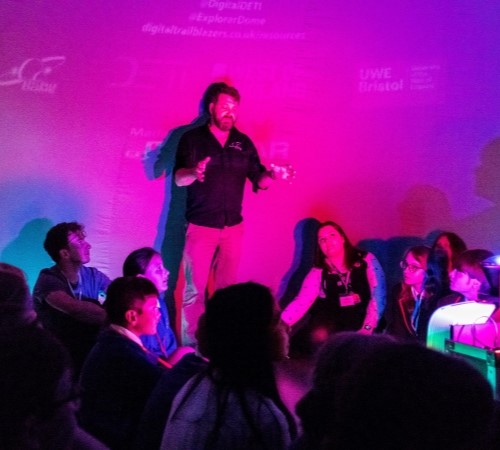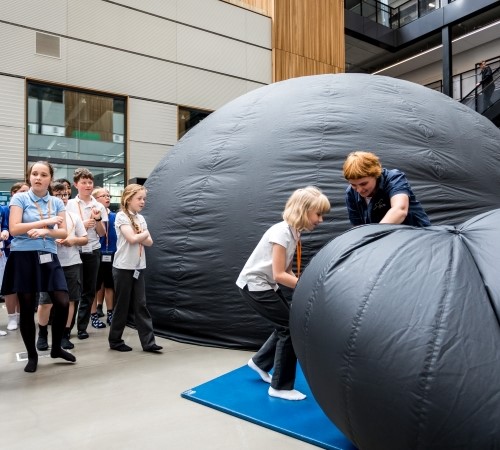
A presenter standing in the middle of students during a planetarium show
We Make Our Future
We Make Our Future was an interactive project funded by the Ingenious public engagement grants scheme to engage diverse audiences, particularly young people, with engineering and sustainability. The project was based on an interactive and educational planetarium show, developed initially for COP26 in Glasgow in 2021 to enable visitors to view engineering marvels. Combining an immersive experience with real-world stories of diverse engineers, the show highlighted the practical and impactful nature of engineering solutions.
Dr Laura Fogg-Rogers, Project Manager and Senior Lecturer in engineering education and communication at UWE Bristol, reflected on the project’s success: “The show raised awareness of how engineering can help people and our planet. It inspired the children to take action in their local areas or in their future careers.”
Engaging the engineers
The project started with storytelling and presentation skills training for 29 engineers, of whom 68% were female and 36% from minority ethnic backgrounds. This training was run in collaboration with Explorer Dome, who provided their top tips for how to engage diverse audiences. It was designed not only to boost the engineers’ confidence but also to equip them with the skills to effectively communicate about their work and its relevance to young audiences.
The engineers provided positive feedback about the training and the project. Many of the comments indicated that the storytelling style of the training and interactive activities had worked well: “Very engaging and fun! Useful introduction to STEM outreach communication, and general skills required.” They also indicated that this variety of ideas was very useful as they developed a suite of options for future engagement situations.

A group of students entering an inflatable dome
Reaching diverse audiences
The heart of the project was its extended outreach, which included 77 shows presented to 2065 children from 17 schools in deprived areas. The response from these students was positive with 93% enjoying the show and 83% learning something new about engineering.
Another key aspect was the emphasis on green jobs and sustainability. Over 86% of the students said they found out how engineering can help the world and 77% expressed interest in finding out more about solutions to save the planet from climate change.
Teachers also noted a significant increase in their students’ knowledge of engineering. One teacher said: “They all felt very inspired and were still coming up with interesting ideas to save the world.” Another reflected: “we loved the presenters. They were so enthusiastic and clearly knew how to talk to children. It was relevant to Bristol, which made it incredibly engaging for them.”
Several teachers highlighted the importance of having diverse engineers displaying career pathways: “showing children people who look like them in those jobs” and appreciating the “exposure to a range of jobs and engineers. Girl in video was great.”
Challenges and adaptations
Despite its successes, the project faced significant challenges. Engaging schools, especially those in areas of multiple deprivation, required the team to overcome significant logistical and financial barriers. "Funding enabled us to make the shows fully funded for schools in low-income areas, removing barriers to participation," Laura noted. Additionally, coordinating with engineers and finding suitable filming locations proved difficult, especially post-COVID.
The pandemic brought its own challenges, such as difficulty in recruiting engineers for in-person training. Schools faced their own post-Covid challenges, which required the project to adapt delivery to suit schools’ changing environments, as well as engineers’ changing working patterns.
Advice for Future Ingenious Projects
“It is important to have a project coordinator,” says Project Manager Laura Fogg-Rogers. “Someone whose job is to actually make this happen, and that is really important because otherwise it can get lost amongst other stuff.” She adds: “then collaborations and co-development with partners who have expertise in outreach and working with schools. This helps in overcoming barriers and ensuring successful engagement”


